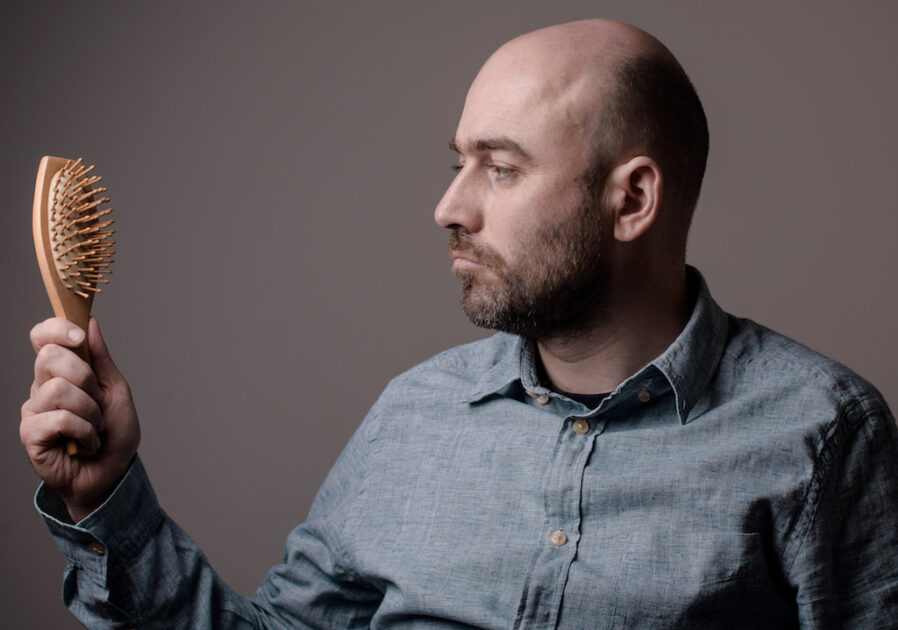What are the causes of hair loss?

There are many reasons why you may be experiencing thinning hair, balding, or hairline recession. Likely you know it’s happening and are at a steady scroll to find out how to help. We get it.
That’s why we wanted to make it simply things for you by breaking down the Top 6 Common Causes of Hair Loss.
Genetics
For men, the most common reason for hair loss is a hereditary condition called male pattern baldness. Previously, we thought hair loss was passed down primarily from the mothers’ side of the family. However, according to Business Insider, baldness is determined by a complex host of genes from your mother and father. A history of hair loss in both parents or grandparents often spells problems for those down the line in the family tree.
Medications
Many drugs used to combat disease can have a significant impact on a person’s hair. Treatments like chemotherapy are commonly associated with hair loss, however drugs designed to tackle other conditions like depression, arthritis, heart disease, and high blood pressure are all known to cause hair to thin in some people. Check out these 11 Common Drugs that Cause Hair Loss.
High Stress Levels
Some people experience thinning hair or shedding following a stressful time in their life. People that go through anxiety or loss of sleep can experience hair thinning as well. Stress and hair loss don’t have to be permanent. In some cases, if you get your stress under control, your hair might grow back.
Alopecia
There are many different types of alopecia. The most common is known as alopecia areata (AA), and is symptomized by small round bald patches that appear at random on the scalp. These patches sometimes go away on their own, but often change position, grow in size or join together.
Alopecia totalis is the total loss of head hair and is often preceded by alopecia areata. Alopecia universalis is the most extreme form and results in the total loss of all body hair. Other forms can be gender-specific like alopecia barbae which affects beard hair, or traction alopecia caused by tight hairstyles, usually experienced by women. Telogen effluvium, again experienced mostly by women, is a generalized thinning of all head hair and can last a lifetime in many cases.
Illnesses
Infections like ringworm and lichen planopilaris affect the condition of the scalp, and in turn, sometimes cause hair to shed or result in patches of hair loss called tinea capitis. Medical conditions like diabetes and lupus are also a contributing factor. Psychological disorders like trichotillomania that compels a person to pull their hair out can also cause permanent damage to the hair follicles.
Hormonal Changes
Major physical changes in the female body such as pregnancy, childbirth, thyroid issues and menopause affect a woman’s hormones. These changes are often rapid, recurrent and enduring, and a side effect is often thinning of the hair. Hair loss in such cases is usually temporary, although it can still affect a person for several months or years.
What factors increase the risk of hair loss?
Some people are more pre-disposed to losing their hair than others. If you check off two or more of these boxes, you may be at a higher risk:
- A family history of baldness
- Your age. Men over the age of 35 are significantly more likely to lose their hair, although in some cases the problem can start in a person’s late teens.
- Living or working in a high stress environment.
- Significant and rapid weight loss.
- Any medical conditions that are known to cause balding like lupus, diabetes or any scalp disorders.
So now that you know what causes hair loss, you may want to do something about it. Often, small lifestyle changes can have a big impact on your chances, but unfortunately, once hair follicles become dormant, they will not produce hair again.
Contact Scalp Micro USA, for a friendly and informal discussion about your hair loss options.

Tired of hair loss?
Get the perfect hairline, 100% guaranteed, with our scalp
micropigmentation treatment that is customized just for you. No more
crazy combovers. No more ineffective medications. Just results.